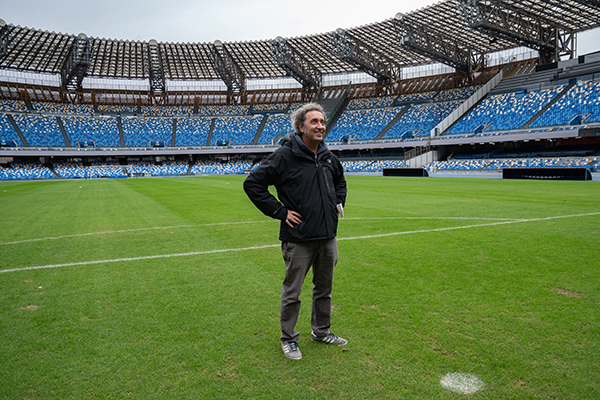Paolo Sorrentino,
the Neapolitan
PostED ON OCTOBER 9
By observing his city of Naples, the great Italian filmmaker Paolo Sorrentino has cultivated his vision of the world and developed his own striking, baroque style.
His latest film, The Hand of God, is a marvel. It is to the rest of his work what Amarcord represented in the legacy of Fellini. While the maestro Federico revisited his memories of being a child in Rimini, Paolo Sorrentino, 51 (who has never made a secret of the fact that he is indebted to Fellini), decided to recount his Neapolitan youth. It conveys the experience of a shy teenager of the 1980s, when the Naples of the football world – meaning all of Naples - waited in disbelief, and then revelled in the arrival of the greatest footballer of the era, Diego Armando Maradona.
Sorrentino is the incarnation of a restless desire that grips a young man and gradually transforms itself into a calling: becoming a filmmaker. The quest was fuelled by a scene, invented or reconstructed, that only Sorrentino can describe: a meeting with the filmmaker Antonio Capuano (for whom he would later write a screenplay), a compelling series of advice to a young artist - to be shown to all young artists. "Only fools go to Rome," quips the actor who plays Capuano (the real Capuano is now in his eighties). "Can’t you see all there is to film here?". He chose to remain in Naples and film in Naples, keeping that Neapolitan essence that explains the Sorrentine style, baroque and grandiose - reflecting the city's artistic treasures.
 Paolo Sorrentino
Paolo Sorrentino
Strangely enough, this art of the grotesque (in the best sense of the word: the Italian art of extravagance and caricature) has asserted itself with each film. After his first feature, One Man Up (2001), which attracted attention in Italy, it was the Cannes Film Festival that established him internationally by showing most of the films that followed in competition. Il Divo, the powerful biography of the Italian "homo politicus" par excellence, Christian Democrat Giulio Andreotti, played by the great actor who has become his most trusted collaborator, Toni Servillo, won the Jury Prize in 2008. The Great Beauty, an unflinching examination of the vestiges of the Roman dolce vita and lauded on the Croisette in 2013, took home the Oscar for Best Foreign Film a few months later.
Literature has served as a big influence, especially Céline: "After reading Journey to the End of the Night, I learned the scriptwriting tricks that intrigue producers. It is a fundamental book. When I write, my literary references, especially French ones, are numerous. What I have appropriated from Journey... is the way I look at people, with an ironic, cynical, disillusioned, disenchanted eye. My idea is that style, even before referencing beauty, must achieve something that I cannot quite define, but which has something to do with power.”
Aurélien Ferenczi
The Consequences of Love (Le Conseguenze dell’amore, 2004, 1h40)
Comoedia Mon11 11:15am | Cinéma Opéra Wed13 2:30pm | Lumière Bellecour Fri15 8:30pm
Il divo (2008, 1h50)
Lumière Institute Mon11 5pm | Lumière Bellecour Wed13 8:30pm | Cinéma Opéra Fri15 7pm
This Must Be the Place (2011, 2h)
Lumière Terreaux Mon11 7pm | UGC Confluence Thu14 5:30pm
The Great Beauty (La Grande Bellezza, 2013, 2h22)
Lumière Terreaux Sun10 7pm | UGC Confluence Mon11 8pm | Villa Lumière Sun17 10:15am
Premiere:
The Hand of God (È stata la mano di Dio, 2021, 2h09)
Pathé Bellecour Sun10 4:45pm
Master Class:
Comédie Odéon Sun 10/10 at 3:15pm
The quotations are extracts from Cinema Vivo, under the direction of Emiliano Morreale and Dario Zonta.

